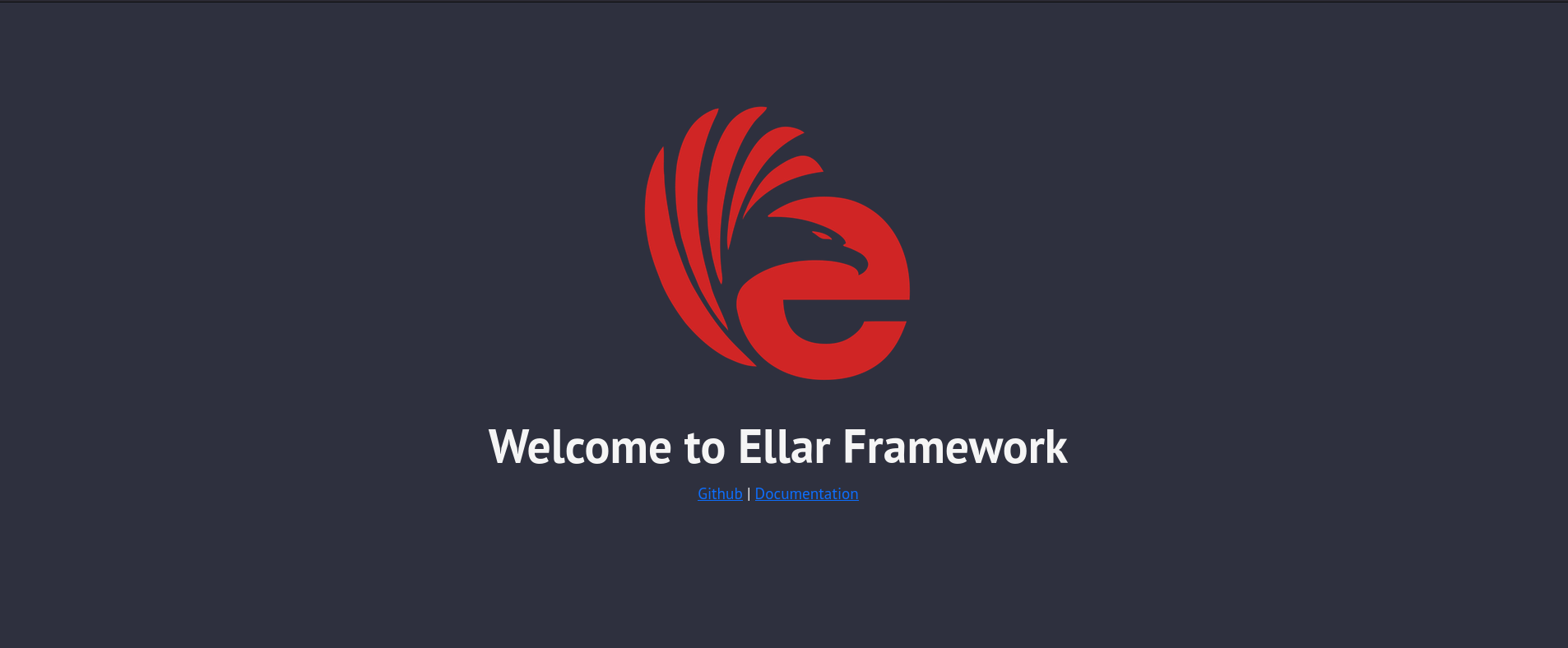Step One¶
You will learn the core fundamentals of Ellar with this set of articles. We are going to build a basic CRUD application with features that cover a lot of ground at an introductory level.
Library Dependencies¶
Ellar core depends on:
python >= 3.7StarletteInjector
Quick Step¶
Using the Ellar CLI, you can easily set up a new project by running the following commands in your OS terminal:
$(venv) pip install ellar-cli
$(venv) ellar new project-name
The new command will create a project-name project directory with other necessary files needed for the Ellar CLI tool to properly manage your project. Also, some boilerplate files are populated and installed in a new project_name to get structure to your project.
project-name/
├─ project_name/
│ ├─ core/
│ ├─ domain/
│ ├─ config.py
│ ├─ root_module.py
│ ├─ server.py
│ ├─ __init__.py
├─ tests/
│ ├─ __init__.py
├─ pyproject.toml
├─ README.md
A brief overview of generated core files:
pyproject.toml | Python project metadata store. |
README.md | Project Description and documentation. |
project_name.core | Core/business logic folder. |
project_name.domain | Domain logic folder. |
project_name.config | Application configuration file |
project_name.root_module | The root module of the application |
project_name.server | The entry file of the application which uses the core function AppFactory to create an application instance. |
In project_name.server, we create the application instance using the AppFactory.create_from_app_module function.
# project_name/server.py
import os
from ellar.common.constants import ELLAR_CONFIG_MODULE
from ellar.app import AppFactory
from .root_module import ApplicationModule
application = AppFactory.create_from_app_module(
ApplicationModule,
config_module=os.environ.get(
ELLAR_CONFIG_MODULE, "project_name.config:DevelopmentConfig"
),
)
There are two ways to create an Ellar application using the AppFactory, create_from_app_module and create_app. Both provides all necessary parameter for creating Ellar application
Run your project¶
Ellar runs UVICORN - ASGI Server under the hood.
$(venv) cd project-name
$(venv) ellar runserver --reload
--reload is to watch for file changes INFO: Will watch for changes in these directories: ['/home/user/working-directory']
INFO: Uvicorn running on http://127.0.0.1:8000 (Press CTRL+C to quit)
INFO: Started reloader process [2934815] using WatchFiles
INFO: APP SETTINGS MODULE: project_name.config:DevelopmentConfig
INFO: Started server process [2934818]
INFO: Waiting for application startup.
INFO: Application startup complete.
Now go to http://127.0.0.1:8000 
For more info on Ellar CLI, click here
To run the application with a different configuration, In project_name/config, Add a ProductionConfig
...
class ProductionConfig(BaseConfig):
DEBUG: bool = False
ProductionConfig string import to the environment with ELLAR_CONFIG_MODULE as key. $(venv) export ELLAR_CONFIG_MODULE='project_name.config:ProductionConfig'
$(venv) ellar runserver
That will start up the application using ProductionConfig
INFO: APP SETTINGS MODULE: project_name.config:ProductionConfig
INFO: Started server process [2934818]
INFO: Waiting for application startup.
INFO: Application startup complete.
INFO: Uvicorn running on http://127.0.0.1:8000 (Press CTRL+C to quit)
One last thing, before we move to the next page, we need to create an app module.
Lets add a car module/app to our project:
$(venv) ellar create-module car apps/
project-name/project_name/apps apps/
├─ car/
│ ├─ tests/
│ │ ├─ test_controllers.py
│ │ ├─ test_routers.py
│ │ ├─ test_services.py
│ ├─ controllers.py
│ ├─ module.py
│ ├─ schemas.py
│ ├─ services.py
│ ├─ __init__.py
car.controllers | A basic controller with an index route. |
car.module.py | car module/app Module metadata definition. |
car.services.py | For Car module service declarations. |
car.schemas.py | Data-transfer-object or Serializers declarations. |
car.tests/ | testing directory for the car module. |
To finish up with the created car module, we need to register it to the project_name.root_module.py
# project_name/root_module.py
...
from .apps.cars.module import CarModule
@Module(modules=[HomeModule, CarModule])
class ApplicationModule(ModuleBase):
@exception_handler(404)
def exception_404_handler(cls, request: Request, exc: Exception) -> Response:
return JSONResponse(dict(detail="Resource not found."))
Goto your browser and visit: http://localhost:8000/car/
{
"detail": "Welcome Car Resource"
}
Enabling OpenAPI Docs¶
To set up OPENAPI documentation, we need to go back to the project folder. In the server.py then add the below.
# project_name/server.py
import os
from ellar.common.constants import ELLAR_CONFIG_MODULE
from ellar.core.factory import AppFactory
from ellar.openapi import OpenAPIDocumentModule, OpenAPIDocumentBuilder, SwaggerUI
from .root_module import ApplicationModule
application = AppFactory.create_from_app_module(
ApplicationModule,
config_module=os.environ.get(
ELLAR_CONFIG_MODULE, "project_name.config:DevelopmentConfig"
),
)
document_builder = OpenAPIDocumentBuilder()
document_builder.set_title('Project Name API') \
.set_version('1.0.0') \
.set_contact(name='Eadwin', url='https://www.yahoo.com', email='eadwin@gmail.com') \
.set_license('MIT Licence', url='https://www.google.com')
document = document_builder.build_document(application)
module_config = OpenAPIDocumentModule.setup(
docs_ui=SwaggerUI(),
document=document,
guards=[]
)
application.install_module(module_config)
Goto your browser and visit: http://localhost:8000/docs/